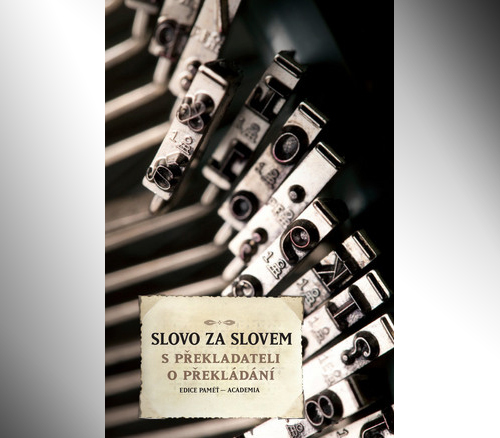Czechoslovak history is closely connected to language and culture; it follows that translation, in particular, is a mighty revolutionary tool in times of oppression…
The twenty-seven interviews with the oldest generation of Czech translators collected in Word by Word (With Translators on Translating) reveal the personal histories of the people who, for more than half a century, were the arbiters of the literary masterworks available to thousands of Czech and Slovak readers.
The book’s interviewees include founding mothers and fathers of modern translation, active in the totalitarian fifties, liberal sixties, and “normative” seventies. They replied to a set of more-or-less identical questions regarding: how they learned foreign languages and fell in love with literature, the writing climate in the 1950s under Stalinist oppression and in the 1970s after the country’s Soviet occupation, and their respective approaches to the original and translated texts. They also recounted the personal memories they attached to particular texts and authors.
The diverse set of interviewees includes Josef Čermák and Věra Dvořáková, who both translated from French and introduced Czech readers to the likes of Jean-Paul Sartre and Michel Foucault; Josef Forbelský, who dedicated his life to Spanish literature and translated Vladimír Holan’s poetry into Spanish; Božena Koseková, translator of Stefan Zweig and Heinrich Böll, among others; and Helena Kadečková, who edited and translated Icelandic sagas. The unforgettable interview with the late Josef Škvorecký (the last he gave before his death), translator of Ray Bradbury, Warren Miller, and Raymond Chandler, is the testimony of a writer forced to hide behind the words of others in the stifling Czechoslovak political climate.
A case in point of these difficult writing conditions is the problematic translation of J. D. Salinger’s Catcher in the Rye, by Luba and Rudolf Pellar. The text’s publication was prohibited, but not for obscenity or political dissent; instead, Stalin’s famous proclamation that the working class use a standardized, agreed-upon vernacular butted heads with Holden Caulfield’s literary slang. Salinger’s novel is anything but standard—and when its translation was finally published in 1960, Holden Caulfield helped loosen the stiff rigidity of Czech literary language.
Czechoslovakian translators in the twentieth century often risked their jobs and their families’ well-being to publish critical and controversial works, assuming the roles of cultural mediators under stringent conditions dictated by the (decidedly non-literary) Ministry of Culture. Every author and text required strict review and a thorough search for the potential of dissident nuance. Translators supplied their texts with an afterword, dutifully furnishing the authorities with an explanation of their choices. Substitution was the common translation method, as was the omission of slang and religious idioms or anything that could be interpreted as degrading members of the working class. Sometimes (rather humorously), pieces directly mocked the authorities: Saroyan’s comparison of his grandmother’s mustache to Stalin’s had to be blacked out by the editor in the whole print run.
Most of the translators interviewed in the book studied foreign languages during the first Czechoslovak republic, either at home or at primary and secondary schools. Some of them acquired their love of translation in Latin or Ancient Greek classes; for others—who were not allowed to continue their professional careers in, for example, journalism, writing, or foreign trade work, and were sent to factories as workers—translation was the only way to quench their intellectual thirst.
…And even though it was the worst of times, it was, in some ways, the best of times. (French-language translator Jarmila Fialová compares the working conditions and situation of translators then and now and claims that the situation has changed for the worse, which is saying something!). Many translators wax nostalgic for the trusting atmosphere of the publishing house, in particular that of Odeon, which acted as a sort of underground intellectual breeding ground: the best example of friendship and trust is the practice known as “fronting,” in which those still allowed to publish lent their names to translators blacklisted by the regime. After 1989, the publishing house compiled a list of translations that appeared under aliases—and it is long enough to be published as a book in its own right!
In the 1970s, translations provided a portal to a world beyond closed borders; there was hardly a need to persuade the reader of the importance of mind-expanding intellectual dialogue provoked by works like Dante’s Inferno. Queues gathered in front of the bookshops on Thursdays (new release days); poetry collections, memoirs, and readers’ clubs subscribed to new titles. A print run of a hundred thousand copies of a poetry collection was as common as a two-hundred number run is today (!).
The planned economy made for quite interesting translation conditions: while quotas determined how many pages one had to edit or translate each day, translators and editors had the luxury of being able to discuss a text for years. On the other hand, many completed works had to wait due to paper shortages, while other (usually Soviet) titles were granted precedence.
The stories of the translators collected in this book might serve as an inspiration and a beacon of hope for those who have lost hope in the current situation, in which what is translated, published, and read (or not read) is dictated by the market and money. Just check out Word by Word for proof that literary fiction, poetry, and translation are important tools of intellectual resistance in times of cultural or social crisis.
***
Stanislav Rubáš (ed.): Slovo za slovem. S překladateli o překládání. Praha: Academia, 2012
***
Aňa Ostrihoňová studied English, American and French language and literature at Charles University in Prague and has a PhD in translating studies from Constantine the Philosopher University in Nitra. After living abroad for several years, including working as a translator for the European Commission and the European Parliament, she returned to Slovakia in 2011 and founded her own publishing house, Inaque. She writes essays and book reviews and translates fiction and non-fiction from English, French and German.

